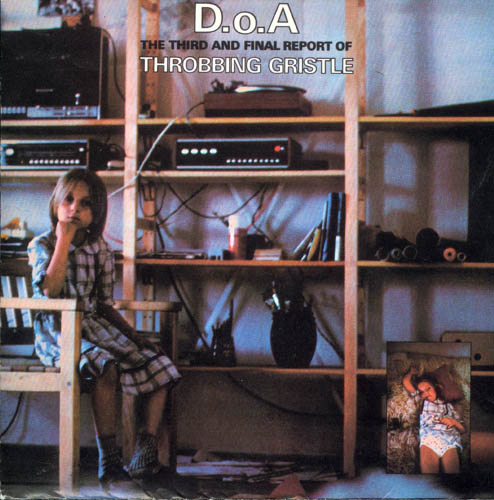 …right, so I’ll get the actual review part out of the way, assuming someone’s reading this from either the perspective of not knowing Throbbing Gristle or is interested in what’s new in this re-release/re-master. This shouldn’t take too long, don’t worry. First – if you don’t know TG, and you’re in any way interested in early industrial music – that is, the variety that wasn’t a pale, cock-heavy, boring version of metal for sexless turds loosely based on a crap simulacrum of 80s electro-pop – you should get one/all of TG’s re-issues (and this is as good a place to start as any). If you’re interested in where sound-art, home-made electronics, noise, found-sound, experimental music, techno, sound-collage [etc etc] come from, TG are what you need. I don’t necessarily think they’re originators of a lot of those things, but in terms of providing a compendium of what experimenting in sound meant in late 70s Britain (away from the sometimes arid world of academic music), TG are utterly indispensable. I read somewhere, years ago, that TG were like the British Velvet Underground but, for my money, while VU were great, they only did so much for rock music – they bring the drone and verbose lyrics, extended form and a few other things, but ultimately their contribution was to realising that rock music could be an intelligent form – TG are legions better than just being an innovative rock group with a heavyweight lyricist and violist. TG were all about the art, man…
…right, so I’ll get the actual review part out of the way, assuming someone’s reading this from either the perspective of not knowing Throbbing Gristle or is interested in what’s new in this re-release/re-master. This shouldn’t take too long, don’t worry. First – if you don’t know TG, and you’re in any way interested in early industrial music – that is, the variety that wasn’t a pale, cock-heavy, boring version of metal for sexless turds loosely based on a crap simulacrum of 80s electro-pop – you should get one/all of TG’s re-issues (and this is as good a place to start as any). If you’re interested in where sound-art, home-made electronics, noise, found-sound, experimental music, techno, sound-collage [etc etc] come from, TG are what you need. I don’t necessarily think they’re originators of a lot of those things, but in terms of providing a compendium of what experimenting in sound meant in late 70s Britain (away from the sometimes arid world of academic music), TG are utterly indispensable. I read somewhere, years ago, that TG were like the British Velvet Underground but, for my money, while VU were great, they only did so much for rock music – they bring the drone and verbose lyrics, extended form and a few other things, but ultimately their contribution was to realising that rock music could be an intelligent form – TG are legions better than just being an innovative rock group with a heavyweight lyricist and violist. TG were all about the art, man…
Oh, did I not mention the live CD? Sorry, awfully rude of me. Where are my manners?
There’s a live CD with a load of recordings from 1978 – and unlike a lot of re-issues, the live shows are nearly as good as the album.
And the packaging is, y’know, plush and all those things re-issues are (sorry to be brusque about that, but it’s exactly what you’d expect from them – photos, nice sleeves for the CDs, plenty of attention-to-detail…)
……
Let’s call that a line and call everything above the line the actual review, and the rest is just some stuff that’s loosely about TG but is ultimately me selfishly harping on about bollocks that not many people are interested in.
Do you know what the problem is with rock music? I mean, beyond the fact that there’s too many penises involved (whether the genital- or personality-type). And the fact that guitarists are the least interesting humans. And all the other things I’m not going to mention. The problem is the album, really. Oh, I know – we all love albums. That’s what we all love. Albums. Not singles – oh no – too easy for women to like them, and dance to as well. We can’t have that. No, the album’s where it’s at – why don’t we make it so that every creatively bereft nonsense has to dilute their already ameliorated talent even further? That’s basically the mentality of most albums.Another part of the problem is that a few albums are actually very good. I mean, have you heard Tago Mago? It’s ridiculous. Insanely good. So good you could kill it and a forest of good would grow in its place, blossoming beautiful fruit of good. It’s a few good ideas stitched together with good playing, goodly recorded and is, basically, very good. Of course, the average musician (who is statistically most likely to be a guitarist, and therefore a boring penis) hears Tago Mago and thinks that, because that album is good, albums in general must also be good. Worse, he then assumes he could make such an album. He can’t, he won’t, and history has proven me incontrovertibly correct on this point.
Anyway. The point is that the album doesn’t really work. You tend to get one or two ideas on an album, maybe a decent single or two, and a load of bollocks. The reason kids don’t buy albums now isn’t because downloading killed the idea, but because they realised there’s no real need to keep up the whole charade that most albums are anything other than utter cock. What’s the best album ever (note: rhetorical question)? Abba Gold. Why? Because it’s a collection of singles. Abba‘s albums were abysmal, by and large (except for the bits of the albums that were “Waterloo” or “Fernando” or whatever).I like to think that it’s this kind of framework that TG were working in. Part of the reason TG stand up, where most of the contemporaneous punk doesn’t, is because TG seemed to have gone ‘oh, this rock music is mostly bollocks, and the bits that aren’t bollocks are the singles. Hmm’ – rather than ‘Down with rock!’ and making rock in exactly the same way it always was (except perhaps a bit shorter and a bit louder, but not so short and loud that you might, y’know, think it was a different thing). Rather than just ape what everyone else did with the album*, TG seem to have sat down and gone ‘right then, this is a bit shit – let’s see what we can do to make it better…’
D.o.A was the first TG album I got, and what I loved about it – and continue to love – is that it’s an album in a very different way to most albums. It’s more like a series of snapshots, a scrapbook of ideas, than it is 12 strained variations on one or two ideas. Experiments don’t have to be fully finished, or even particularly developed (as with the single-sped-up “United”) – what matters is that an album represents the four players, as a group and individually – and rather than watering down the four people’s ideas into a ‘will this do?’ soup of compromise, there’s room for expression. The group identity, as such, feels more like albums are a chance to curate an exhibition of themselves, an exhibition of ‘you could do this with music.’
I don’t want to suggest TG were in any way slapdash about putting together records – their methods of putting together compendiums of their own experiments – from songforms, dirges, walls of noise, found-sound (etc) – feel like they want music to be art, to be given the dignity of intelligence, to be approachable by the non-musician and musician alike… and to represent more than just ‘I love you’ or ‘let’s fuck.’ It feels like they’re desperately in love with music/sound, and want the album to do so much better as a format. It’s quite ego-less music, really. I always come back to D.o.A as the absolutely perfect way to sequence an album. It’s that switch from “Hamburger Lady” – which is perfectly vile and harrowing – into the really cute “Hometime” that I love. Not because of some ‘transgressive juxtaposition’ or similar haughty nonsense – but because that’s how we take in life. In little bites of terror and sweetness. Rough with the smooth and all that bollocks.What’s probably most shocking about TG isn’t the songs about burn victims, “Blood on the floor” or their (surely ironic) title of ‘wreckers of civilisation’ – but that the album carried on being a format for 12 variations on ‘why am I not getting laid today?’ when TG showed us it could be so much more.
And for what it’s worth (if we’re still pretending this is a review rather than a eulogy), D.o.A remains TG’s best moment on record.
-Kev Nickells-
*Yes, I do blame the fucking Beatles.




One thought on “Throbbing Gristle – D.o.A: The Third and Final Report of Throbbing Gristle.”
Late to the party, but this is brilliant, an awesome review and yes eulogy in light of Genesis P-Orridge’s impending death. BTW ‘Wreckers of Civilisation’ was actually a title applied to COUM Transmissions pre TG. Been a fan since day 1 (and I’m only 50!).